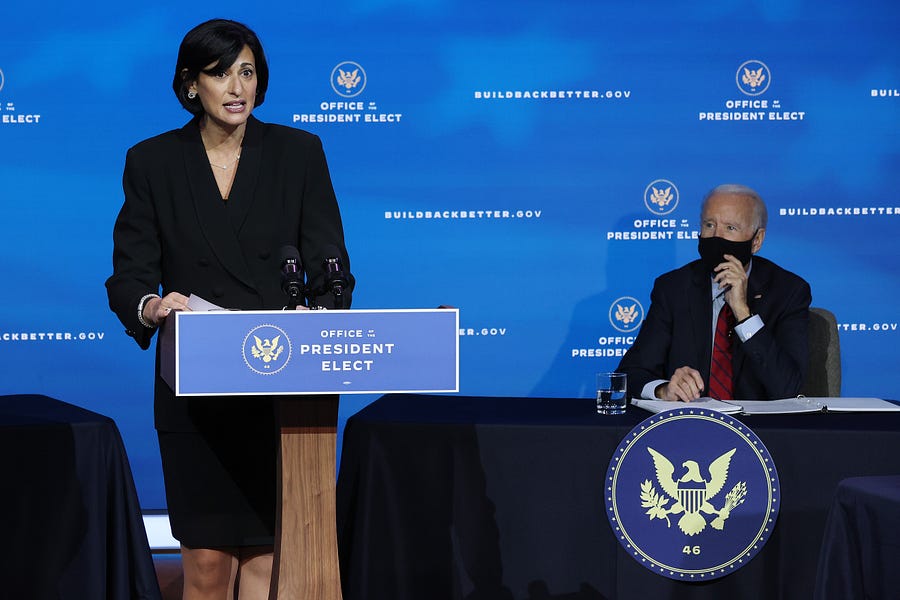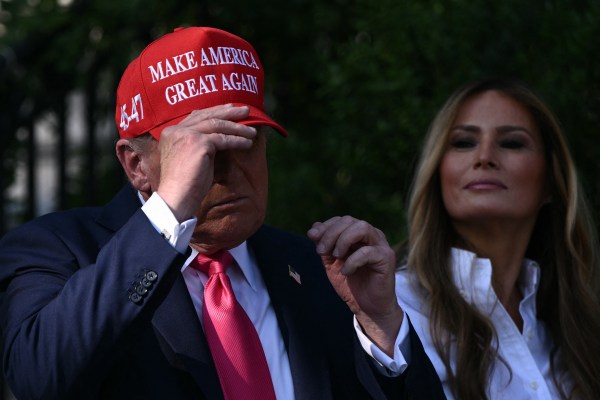In our increasingly secular age, being on the side of science is similar to being on the side of God—a way to settle an argument by not actually making an argument. Just enlist an unassailable authority and move on.
That’s how Joe Biden campaigned for president, vowing to “follow the science” on the COVID-19 pandemic wherever it led him. Only now it seems like he’s leading the science as much as the science is leading him. And that was inevitable.
First, as with God, it’s sometimes difficult to know what science says. This isn’t meant as an anti-science talking point. Science is good. Science is real. But science doesn’t speak on every issue with a booming voice that clears all doubts like a thunderclap scattering pigeons. Sometimes scientists—the high priests charged with telling us what science says—disagree with each other. (Priests also have their disagreements. You can look it up.)
And sometimes science gets things wrong. Phrenology—basically palm-reading applied to your skull—was briefly considered cutting-edge science. It’s now widely recognized as pseudoscientific quackery. Today’s “settled science” is often tomorrow’s “I can’t believe we said that.”
Then there are politicians. They rely on the experts. But they tend to rely on the experts who tell them what they want to hear or advise them how best to do what they already want to do. Liberal presidents rarely hire right-wing economists, and vice versa. This doesn’t mean anyone is necessarily acting in bad faith. It’s just how things tend to work.
There’s also the problem of scientists trying to think like politicians. In any given year, public health officials—at the CDC, NIH, etc.—issue all manner of advisories and guidelines. It’s important work. Doctors and local government officials heed this stuff. But you know who doesn’t? Most Americans.
In 2009, there was a major swine flu pandemic. Do you remember sitting on the edge of your seat for the latest CDC guidelines or advisories? You might if you had special health considerations or a job that required it. But for most people, such statements were the equivalent of the white noise Charlie Brown’s teachers would make in the old Peanuts cartoons.
The COVID-19 pandemic is different. The lives of Americans have been disrupted on a mass scale not seen since World War II. So everyone is paying attention. This must be a heady experience for many public health officials. If your normal experience involves desperately trying to get the attention of the public and the media, and suddenly you have the opposite problem—people hanging on your every utterance— you approach things differently. This isn’t a point about inflated egos or power going to anyone’s heads, though I think that would be a natural point to make (with some merit). Rather, it’s a point about a very real policy challenge.
For instance, last summer, Dr. Anthony Fauci, the director of the National Institute of Allergy and Infectious Diseases, was asked by The Street why health officials had publicly downplayed the importance of masks given that the science is clear about their efficacy. He explained that masks were in “short supply,” and officials wanted to make sure there were enough for the health care workers who needed them most. It was a perfectly legitimate concern. It was also an admission of a lie.
One could argue it was a noble lie, but you can’t say the same about the Biden administration’s various equivocations, denials, and misdirections on the issue of schools reopening.
Last month, CDC Director Rochelle Walensky said science was on the side of kids going back to school as quickly as possible. The next day, the White House—no doubt chastened by teachers unions—walked that back. White House press secretary Jen Psaki said Walensky was speaking in her “personal capacity.”
This week, the governors of Texas and Mississippi announced they were lifting lockdowns and mask mandates. I think that was a mistake, but not an outrageous or obvious one. Florida lifted such rules long ago, and it has performed better than California and New York. Biden called the decisions “Neanderthal thinking,” the insinuation being that he has a monopoly on the science.
He doesn’t. And even if the science is mostly on his side, politics is about more than following what scientists say. It’s about balancing competing notions of the public good. Science must have a voice in that conversation, but it’s just one of many.







Please note that we at The Dispatch hold ourselves, our work, and our commenters to a higher standard than other places on the internet. We welcome comments that foster genuine debate or discussion—including comments critical of us or our work—but responses that include ad hominem attacks on fellow Dispatch members or are intended to stoke fear and anger may be moderated.
With your membership, you only have the ability to comment on The Morning Dispatch articles. Consider upgrading to join the conversation everywhere.